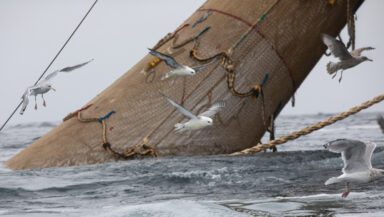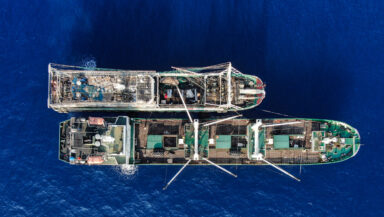From climate change to deep sea mining, overfishing and pollution, our oceans are under threat like never before. Just 1% of the high seas – the vast expanses of the ocean that lie beyond national boundaries – are properly protected right now.
Scientists advise that we should protect at least 30% of the world’s ocean by 2030 to avoid irreversible destruction to marine life and coastal livelihoods. The clock is ticking to meet this goal.
To demonstrate its commitment to global ocean protection, the government must:
- Ratify the Global Ocean Treaty into UK law before the general election. The government has stated that it plans to ratify the Treaty by the UN Ocean Conference in June 2025. The UK’s ratification process must be urgently accelerated if we are to stay on track with the global goal of protecting at least 30% of the world’s ocean by 2030.
- Develop proposals for ocean sanctuaries in the high seas, starting with the Sargasso Sea. The Sargasso Sea is a uniquely biodiverse part of the Atlantic Ocean, but it is under threat from industrial fishing and pollution. There is already political momentum from countries in the region to protect this area, which the UK should support and help to lead.
What is the Global Ocean Treaty?
The ocean plays a vital role in regulating our climate, supporting marine biodiversity, and providing food and livelihoods for billions of people. However, the world’s oceans face extreme and growing threats from human activity.
The Biodiversity Beyond National Jurisdiction (BBNJ) Treaty – often referred to as the Global Ocean Treaty or UN High Seas Treaty – provides a legal route to protecting vast areas of the high seas for the first time in history. Once it enters into force, it will enable countries to work together to create a network of ocean sanctuaries across the globe, putting protections in place for fragile ecosystems and marine life. This is currently the world’s only pathway to meet the global 30×30 goal of protecting at least 30% of the world’s ocean by 2030.
Ocean sanctuaries are like national parks at sea. By putting limits on destructive activity, like industrial fishing, drilling and mining, they give marine life a chance to recover and thrive. Healthy oceans with diverse ecosystems are more resilient to environmental stressors such as climate change, pollution, and overfishing. By protecting these areas, we can mitigate the impacts of these destructive threats and allow marine ecosystems to recover. Ocean sanctuaries also help to reduce the impact of climate change by preserving critical habitats like mangroves, seagrass beds, and coral reefs, which act as carbon sinks. Protecting these vast stores of blue carbon is critical in slowing climate change.
Speedy ratification is key to meeting the world’s 30×30 commitment
The Treaty will only enter into force 120 days after 60 countries ratify. With just six years left until 2030, time is running out to protect at least 30% of the world’s ocean by the end of the decade. Countries around the world must urgently prioritise ratifying the Global Ocean Treaty so that it can come into force as soon as possible. So far, four countries have formally ratified the Treaty: Palau, Chile, Belize and Seychelles. Many other countries are expected to follow within the year, including the European Union which is in the process of ratifying the Treaty this month.
The UK was one of the first countries to indicate its intention to ratify the Treaty, by signing it at the UN as soon as it opened for signatures. But the government has since delayed introducing the legislation needed to ratify the Treaty until after the general election. To maintain its commitment to the 30×30 goal, the government must urgently accelerate its own plans to introduce legislation. Kevin Foster MP has also introduced a Private Member’s Bill to ratify the Treaty, which the government could support and use as a vehicle to ensure ratification is prioritised this year.
Join countries to protect the Sargasso Sea
The work to develop plans for high seas ocean sanctuaries cannot wait until the Global Ocean Treaty enters into force. Countries must start the alliance building and engagement of stakeholders – especially indigenous groups and frontline coastal communities – in parallel to ratifying the Treaty. The UK should support the development of as many proposals as possible for new ocean sanctuaries, which are likely to be advanced by different coalitions of countries in the coming months.
The Sargasso Sea, nicknamed the “golden floating rainforest”, is home to a rich range of species, and acts as a huge carbon store for the planet. But this uniquely biodiverse part of the Atlantic Ocean is at risk of overfishing, pollution and shipping traffic. The UK government already works alongside other countries to advance the Sargasso Sea’s protection, via the Sargasso Sea Commission. Bermuda, a UK overseas territory, also sits in the middle of the Sargasso Sea and is a champion for its protection. Last month, Bermuda’s Deputy Premier called for the Sargasso Sea to be prioritised for protection under the new Treaty. The UK should begin working with Bermuda and other countries in the region to jointly spearhead a proposal for an ocean sanctuary in the Sargasso Sea, ready to present at the Treaty’s first Conference of the Parties (COP1).



